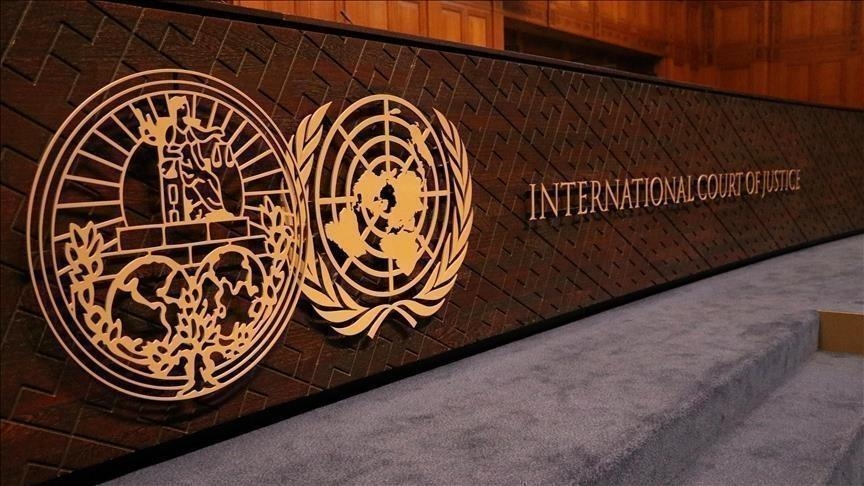
ISTANBUL
As Israel continues its deadly war on Gaza, leaving a trail of destruction and a rising death toll of Palestinians nearing 23,000, international attention is turning toward demands for justice and accountability.
Calls are growing louder for the involvement of key international legal bodies, such as the International Court of Justice (ICJ) and the International Criminal Court (ICC) to address and investigate allegations of war crimes and genocide.
South Africa has filed a case against Israel at the ICJ, accusing it of committing “genocide” in Gaza, with the hearing scheduled to start next Thursday.
A crucial question that arises is how exactly the ICJ and ICC function, and how the two differ from each other in their mandates and legal powers.
What is the ICJ?
The ICJ also referred to as the World Court, is the highest court of the UN, and is considered to be its “main judicial organ.” Established in June 1945 by a UN charter, it began functioning in April 1946.
Seated in The Hague, the Netherlands, the ICJ is a civil court that settles disputes between countries, not individuals.
The court aims to resolve legal disputes in accordance with international law between countries as well as provide advisory opinions on legal matters referred to it by UN bodies.
This court operates under the Statutes of the ICJ, the UN Charter 1945, and the Convention on the Prevention and Punishment of the Crime of Genocide 1951 (Genocide Convention 1951).
What is the ICC?
Founded in 2002, the ICC is defined as the world’s only permanent international criminal court. Also based in The Hague, the Netherlands, it seeks to investigate and prosecute individuals for four offensives such as crime against humanity, war crimes, genocide and crime of aggression.
It is governed by an international treaty called the Rome Statute.
The ICC on its website declares it as “a court of last resort,” and that it seeks to complement and not replace national courts.
How do the courts function?
The ICJ is composed of 15 judges, including a president and a vice president, elected by the UN’s General Assembly and Security Council.
Elected for a 9-year term, these judges are eligible for reelection.
The ICC, on the other hand, has 18 judges, who are elected by the member states.
The court carries its investigation in cases through the office of the prosecutor, which is currently being headed by lawyer Karim Khan.
Who are members of the ICJ?
For the ICJ, only member states of the UN are eligible to appear before the court.
Currently, around 193 states are members of the UN, as article 93, paragraph 1, of the Charter of the United Nations provides that all “members of the United Nations are ipso facto parties to the Statute.”
The ICJ seeks to settle disputes between countries, if they voluntarily participate in the proceeding, and then are bound to follow with the decision of the court.
The ICJ says that it has no jurisdiction to entertain requests from individuals, NGOs, corporations, or private entities.
Who are members of the ICC?
The ICC has 123 members, which are state parties to its Rome Statute. Out of them, 33 are African countries, 19 are Asia-Pacific nations, 18 are from Eastern Europe, 28 are from Latin American and Caribbean states, and 25 are from Western European and other states.
Countries such as the US, Israel, and Russia are not members of the ICC.
The ICC looks into the crimes that were committed on or after July 1, 2002, the day when it was established.
The member countries can refer cases within their own jurisdiction to the court, or the UN Security Council can refer or the prosecutor can launch an “on one’s own initiative.”
The ICC has the jurisdiction to investigate non-member states if the offensives took place on the state parties’ territories.
What cases has the ICJ handled?
The ICJ has looked into over 190 cases, according to its official website.
Some significant cases include Nicaragua v. United States of America, when in 1986, the ICJ ruled that the US had violated international law and supported rebel groups against the Nicaraguan government. The US refused the court’s ruling, and vetoed “enforcement action” when the decision was sent to the Security Council.
Another prominent case was when in 1993, the Republic of Bosnia and Herzegovina instituted proceedings against Yugoslavia for crimes of genocide.
Neighboring countries have also gone to the ICJ regarding their border disputes. In 2021, the ICJ determined the maritime boundary between Somalia and Kenya.
What cases has the ICC handled?
According to the ICC website, there have so far “been 31 cases before the Court, with some cases having more than one suspect.”
ICC judges have issued 40 arrest warrants, the website says. Most of those indicted have been from African countries.
Around 21 people have been detained in the ICC detention center and have appeared before the court, including Charles Taylor, the former president of Liberia.
Another 15 people remain at large. Charges have been dropped against seven people due to their deaths.
In 2023, the ICC issued an arrest warrant against Russian President Vladimir Putin, declaring that he is responsible for the war crime of forcibly deporting and transferring children from occupied Ukrainian territory to Russia.
The Russian government refused to accept the decision, saying that it does not recognize the ICC’s jurisdiction.
A prominent case referred to the ICC by the UN Security Council was of Muammar al-Gaddafi, who was accused of killing civilians during the Arab Spring protests.
An arrest warrant was issued but was withdrawn after the former Libyan strongman was killed in 2011.
The ICC has also issued arrest warrants for former Sudanese President Omar al-Bashir on charges of “genocide and war crimes.”
Another former president, Ivory Coast’s Laurent Gbagbo, was arrested on ICC warrants in 2011 on charges of murder, rape and other crimes, but was acquitted by the court in 2019.








